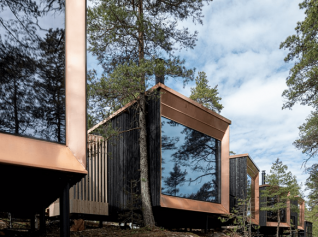The weird, whacky and wonderful world of hotels

by Yeoh Siew Hoon
I don’t know when I first became fascinated with the idea of hotels.
Perhaps it was when I took on a part-time job while waiting for my exam results in Penang. I was the telephone operator/receptionist/concierge/secretary – multi-tasking was big even in those days – at a local hotel by the sea.
This was a hotel that did 130% occupancy on most days, rising to 150% on weekends. On Saturday nights, it even did 200%.
I never got to do the night shift much as I wanted to, just to see who these creatures of the night were.
My boss man said it wasn’t a job for girls but every morning when I came in to work, the Indian security guard who acted as night duty manager would hand me a pile of identity cards tied up with rubber bands.
Without the boss man knowing, I would go through the cards and imagine the people and lives behind the names. I later learnt there was usually only one story but back then I still believed in dragons and princesses.
Anyway my job was to hand the cards back to their owners – discreetly. “Don’t look them in the eye, whatever you do,” warned my boss who fed his staff on a ration of fried fish and pickled vegetables during lunch breaks.
I often wondered what would happen if I did look them in the eye – would I have got poked in the eye with a burnt stick, as my Australian friends would say?
But I learnt the first lesson about the hotel business. Discretion is the better part of valour. (This is why when you ask general managers to share juicy stories, they often just snigger and smirk. One day, I swear.)
My second brush with hospitality came when Shangri-La opened its Rasa Sayang Resort in Penang in 1973. I wondered what the fuss was all about. The newspapers were full of praise for what they said was the most beautiful resort in Malaysia, even South-east Asia.
To my friends and I, it looked funny and old – slanting roofs and so much wood. To our parents, whose all-consuming dream was to move us out of our wooden houses to homes built of concrete, it seemed strange that people would rave so much over a mostly-wooden structure that, by the way, cost millions to build.
Several years later, I took my mother to The Datai in Langkawi for a birthday treat and she looked at me, thoroughly bewildered, and said, “You mean you paid so much for me to stay in a wooden house?”
I learnt then the second lesson of the hotel business – you can’t please everyone.
Yet hotels for the most part try their best to please everyone. This is why most of them have the same kind of lobbies (marble, stairway, chandeliers), the same kind of restaurants (open kitchen, theatre-concept), the same kind of bedrooms (big, bigger and biggest beds), the same kind of bathrooms (rain showers being the latest rage) and the same kind of televisions (flat screen LCD but of course.
This also explains why in some luxury hotels, the breakfast menu doorknob card can sometimes read like a novel because they simply have to offer everyone everything.
You see, to please everyone, you have to cater to the lowest common denominator (LCD) in whichever customer segment you’ve chosen to be in. So a five star hotel will cater to the highest of the LCD while a three star will pitch at the lowest of the LCD.
This is why it is sometimes difficult to tell which hotel you are sleeping in and which city you are in when you wake up in the morning. Yes, you may blame it on those late night dinners and drinks but I always blame it on that same painting (wallpaper art), that same bedside lamp and that same alarm clock.
But they say great things are happening in the hotel industry. Everyone’s talking about the room of tomorrow. Technology is going to play a big part in it.
The TV set will become the thing upon which all things converge. No need for us to carry laptops and our Blackberrys anymore. We may not even need to pay Internet charges.
All we need is a super dongle on which we can dangle our entire hard disk. Just plug it in and work and play. We can download our music, play our videos – even make our own road movies – on the TV set so the family back home knows exactly what it is we are up to.
We will be able to conduct video conferencing from our hotel room – the TV will come with webcam. Welcome to Big Brother Hotel.
Rain showers will be fitted with LCD lights and emit different coloured jets of water as we stand and dance under them – our own shower inferno.
Beds will become capsules that are oxygen-infused. In cities such as Hong Kong, Shanghai and Macau where fresh air has become a rare commodity, oxygen bed capsules will be in high demand by business travellers.
We will carry a super-chip smart card that will do everything including open the hotel door and safe as well as tell everyone where we are at any time. The bosses will love this.
I know, I am getting carried away. Hotels in Asia are already among the best in the world and we are reminded of that everytime we find ourselves squeezed in a shoebox of a room in London, Paris or New York for which we have to pay three times the price and the privilege of being barked at sometimes by rude, very average staff.
Truth is, I think hoteliers have one of the most challenging jobs in the world.
This is because the hotel is a world of contradictions. It is at once the most public place yet the most private domain. It is where everyone can walk into and yet the place where people shower, sleep and do whatever it is they do when they are on the road.
It is a place for public consumption and intimate deeds.
It is a place where people have to make their temporary home while they are away from home.
So we behave strangely when we are in hotels. We take on a different persona. Mr Nice and Efficient becomes Mr Rude and Messy. Mr Married and Stable becomes Mr Playboy. Ms Prim and Proper becomes Ms Party Girl. Ms Demure becomes the She-Devil. Dennis The Proper becomes Dennis The Menace.
The moment we walk past the hotel doors, we become someone else.
We demand, we clamour. We pay, we expect. The more we pay, the more we expect. The more hotels there are, the more we demand. The more we sense they want our business, the more we withhold our custom.
Some of us are loyal – too loyal, considering the number of loyalty cards each of us hold. Some of us are fickle. Some of us are rude. Some of us are polite. Truth is, we are all people with individual fancies, fetishes and fantasies.
And the hotelier has to find a way to please all of us.
Now before we all start feeling sorry for hoteliers, let me quickly say the general manager is one of the most interesting species I have ever encountered.
I once said that they make ideal husband material. They dress well. They wear the dandiest suits. Most of them cook well, having learnt to peel potatoes from a very early age.
All of them entertain well – they know their wines and food. And they know how to keep a clean house – you can always spot the general manager. He’s the one walking with his hands behind his back, occasionally stooping down to pick up some piece of paper from the floor when he thinks no one isn’t looking.
Most of all, he encapsulates the art of hospitality which someone once defined as “the art of making others feel at home when you wish they were”.
(Note: Names have been withheld to protect the innocent and general managers have been referred to as “he” because well, there aren’t too many women general managers around yet. Hopefully this will change in the next 25 years.)
This article was written for Business Traveller Asia Pacific to commemorate the publication’s 25th anniversary.
Catch up with Yeoh Siew Hoon every week at The Transit Cafe – http://www.thetransitcafe.com/
 United Kingdom
United Kingdom United States
United States Asia Pacific
Asia Pacific












































EU entry-exit system delayed again
Jet2 unveils Samos as new Greek destination for summer 2026
ATC strike in Greece could disrupt flights this week
Carnival Cruise Line hosts Prague getaway for Fun Ambassadors
US tourism hit with UK, Germany travel warnings